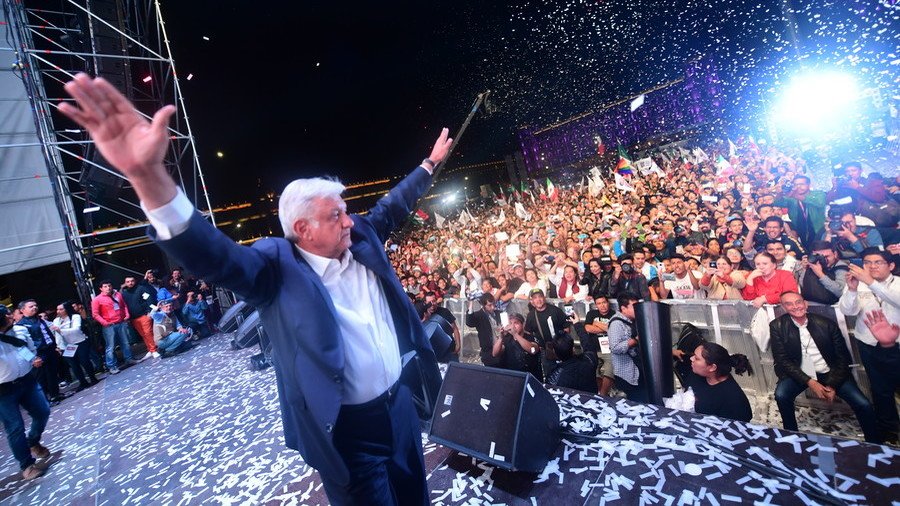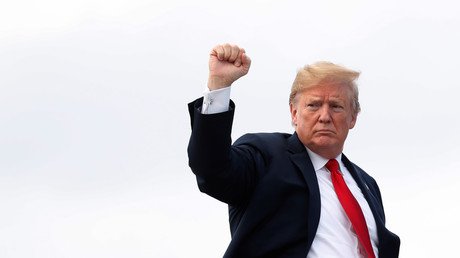Mexico chooses new left-leaning president who may give US ‘sleepless’ nights

Anti-establishment politician Andres Manuel Lopez Obrador is Mexico’s next president. An outspoken critic of Donald Trump, he may align with socialist governments in Latin America and look for closer ties with China and the EU.
Obrador attracted around 53 percent of votes, leaving his closest competitors well behind. The final count is not available yet, but it’s unlikely to shake the decisive victory of Obrador, commonly referred to by his initials AMLO and by his nickname “Peje” – a thin-skinned fish found in his native state of Tabasco.
AMLO is an anti-establishment politician who managed to rally a broad coalition of various leftists and conservatives under his banner, promising drastic changes in Mexico’s life. The anti-establishment drive of the new president-elect is likely to begin with himself, as he promised to slash in half his own salary, as well as end the practice of lifetime pensions for former presidents.
He also vowed to tackle the direst problems of the country – poverty, corruption and widespread violence, has signaled a readiness to finish the bloody, 20-years-long war on drug cartels and is mulling the possibility of an amnesty for petty criminals willing to get back to normal life.
Fair & friendly relations with US or seeking partners elsewhere?
Obrador has been an outspoken critic of US President Donald Trump and, while advocating ‘friendly-yet-fair’ relations with Mexico’s northern neighbor, he has warned the US against treating Mexicans as their “subordinates.”
AMLO devoted a significant part of his victory speech to the migration issue. The president-elect appears to be devoted to fixing it –not through Trump’s wall-building approach, but by quite the opposite means– through improving the lives of the most vulnerable in Mexican society.
“Whoever wants to emigrate should do it out of desire and not out of necessity,” he stated.
Trump has already congratulated Obrador on his victory, signaling that the two leaders might actually come together and stating that he was looking “very much forward to working with him.” On Monday the US president told reporters that he had already talked to Obrador and believed the new Mexican leader would help the US with its border “issues.” The two leaders have also discussed prospects for the North American Free Trade Agreement (NAFTA) and a possible separate trade deal between Mexico and the US.
Obrador, however, has repeatedly warned that he would not remain silent if Trump continues with his “hate policies” and further “insults” Mexicans, as he has repeatedly done since he has been in office. If relations with the US don’t go in the right direction, Mexico’s new president actually has a variety of other options, given the strained relations between Washington and its allies, and the recently-started trade wars, Gerald Horne, the Moores Professor of History and African American Studies at the University of Houston, believes.
“AMLO has more than one card to play. Number one, I expect him to tighten relations with China, I expect him to tighten relations with Japan and expect him to tighten relations with the European Union,” Horne told RT, adding that Obrador’s win spells the end to the “collaborationist approach” to Trump, shown by the outgoing Mexico president, Peña Nieto.
Moreover, AMLO’s decisive victory might signal a resurgence of the left in Central and Latin America, whose ranks have suffered a chain of setbacks over the past decade, Horne believes. And if Mexico would cozy up with socialist governments, it certainly “would cause sleepless nights in Washington.”
“It revived the Latin American left, which had suffered in recent years because of the impeachment of Dilma Rousseff in Brazil and the stepping down of Kirchner in Argentina. Now you have Latin America’s second largest economy and its largest Spanish-speaking nation, now able and capable of aligning with Cuba, Venezuela, Bolivia and Nicaragua,” Horne said.
Kremlin ships (not) gold to Andres Manuelovich!
The current presidential election was not free from (almost-obligatory) allegations of the notorious “Russian meddling,” as some claimed that Amlo’s campaign might have been backed by the Kremlin. The bold accusations were produced by top US officials, with then-National security advisor H.R. McMaster claiming last December that he had “initial signs of [Russian meddling] in the Mexican presidential campaign already.”
Lopez Obrador laughed off the accusations, releasing a short video mid-January in which he stands by the sea, “waiting” for a Russian submarine carrying him a load of gold for the campaign. Smiling at the camera he says “I am no longer ‘Peje,’ now I‘m Andres Manuelovich.” The video has been viewed nearly half a million times since then.
If you like this story, share it with a friend!















